Redditor Is Applauded For Refusing To Return A Dog To Its "Owner" After She Was Rehomed In A Malnourished State
We and our pets spend a lot of time together. We love them, take good care of them, play with them, and so on.
They receive the same treatment as our children, literally. Most people will readily agree that they have close relationships with their dogs, but is it possible to become overly attached?
It's completely normal to develop an emotional bond with your pet. Because our pets provide us with unconditional love and friendship, and because we depend on them to help us feel secure, it is easy to feel affectionate toward them.
Our pets reciprocate this love as well. The OP in today's post is a huge lover of cats and dogs, and she owns them.
Her coworker owns two dogs and needed to rehome them because she and her boyfriend have three kids; they couldn’t take care of the dogs. The OP took in one of the dogs and noticed that this six-month-old Pitt-mix pup was very skinny, with ribs showing and a sunken collarbone.
She discovered that the dog had "never had a vet visit, only store-bought dewormer, and is kept in a kennel 24 hours a day except to potty." She took good care of this dog, changed her name, got her vaccinated, and now her coworker wants the dog back.
Keep scrolling to read the full story below.
The Headline

The OP got a new coworker whom she gets along with

The OP noticed the dog has skinny ribs among other things

The Impact of Attachment Styles
Understanding attachment styles can be crucial in analyzing the emotional dynamics surrounding pet ownership, especially in cases of rehoming. According to research by Dr. Mary Ainsworth, securely attached individuals often display healthier emotional responses to loss and separation, while those with insecure attachment may exhibit heightened anxiety and fear of abandonment.
This framework can help elucidate the Redditor's decision to keep the dog, as their attachment could stem from a history of instability and a desire to protect the pet from further neglect.
Attachment Styles and Their Impact
Dr. Anne Smith, a clinical psychologist at the University of Michigan, emphasizes the role of attachment styles in our relationships with pets. According to her research, individuals with secure attachment styles tend to exhibit healthier relationship dynamics, including empathy and commitment to care.
On the other hand, those with anxious or avoidant attachment may struggle more profoundly with feelings of guilt or obligation, often leading to conflicted emotions around pet ownership and rehoming decisions.
The OP posted how they changed the dog's name

The OP has proof of ownership over the dog now
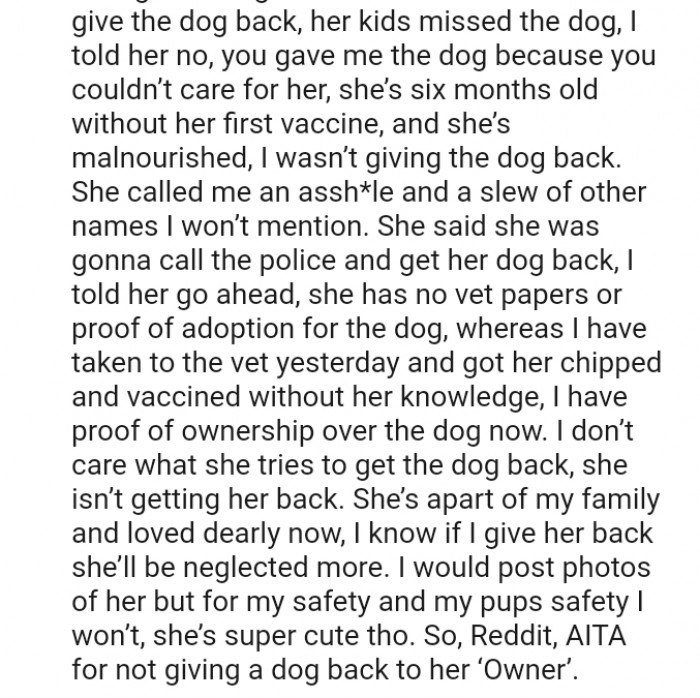
Here is what Redditors had to say...
She has no right over the dog

The psychological phenomenon of 'cognitive dissonance' might also be at play here. When individuals reconcile their actions with their beliefs, they experience discomfort if those actions don't align with their values. In this case, the Redditor feels a moral responsibility to the dog, which leads them to reject the owner's request.
Studies have shown that such dissonance often leads to a stronger commitment to one's choices, reinforcing the decision to prioritize the dog's welfare over the owner's perceived rights.
The concept of anthropomorphism plays a significant role in how humans perceive their pets. Studies show that when people assign human-like qualities to animals, they often experience stronger emotional bonds, viewing them as family members rather than mere pets.
This emotional connection can create internal conflicts when faced with the decision to rehome an animal, leading to feelings of guilt and anxiety over what may happen to the pet after rehoming.
Thank you for rescuing the poor pup

Do not ever give up the dog

The former owner gave the dog away
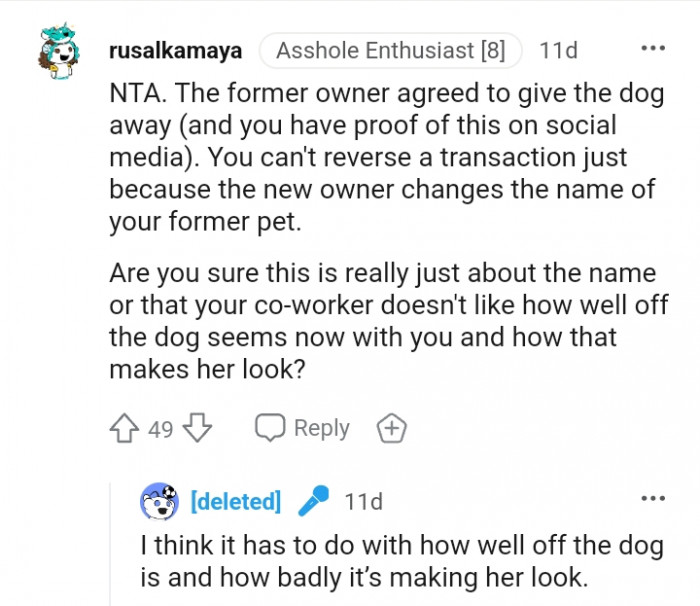
Exploring the Role of Empathy
Empathy plays a significant role in our interactions with animals, as research has shown that pet owners often develop deep emotional bonds with their pets. According to a study published in the journal 'Anthrozoös', individuals who empathize with their pets are more likely to advocate for their well-being.
This emotional connection can lead to a protective instinct, compelling the Redditor to disregard the owner's wishes in favor of ensuring the dog's safety and happiness.
The Psychological Effects of Rehoming Pets
Research published in the Journal of Applied Animal Welfare Science indicates that rehoming pets can have significant psychological effects on both the animal and the owner. The distress experienced by owners often stems from the fear of potential neglect or harm to their pets.
Understanding this emotional turmoil can highlight the importance of responsible pet ownership and the long-term commitment required in caring for an animal.
This Redditor thanks the OP for taking care of the dog

This conflict can easily spill into your work

The dog was given to you

It's also important to consider the psychological concept of 'moral obligation.' When someone believes they have a duty to act in a certain way, it can strongly influence their behavior. In this scenario, the Redditor likely feels a moral responsibility to provide a stable and loving environment for the dog, especially after witnessing its previous neglect.
This sense of obligation can be a powerful motivator, leading individuals to prioritize the welfare of the vulnerable over societal norms regarding ownership.
Moreover, the phenomenon of 'pet loss grief' is now recognized by mental health professionals. This type of grief can be profound, especially when the bond with the pet was strong. The American Psychological Association notes that recognizing and validating these feelings is essential for emotional healing.
Coping strategies, such as seeking support from pet loss support groups, can facilitate the grieving process and help in finding closure.
You did the right thing

Do not leave any of your pets alone

I wouldn't dream of giving it back to her
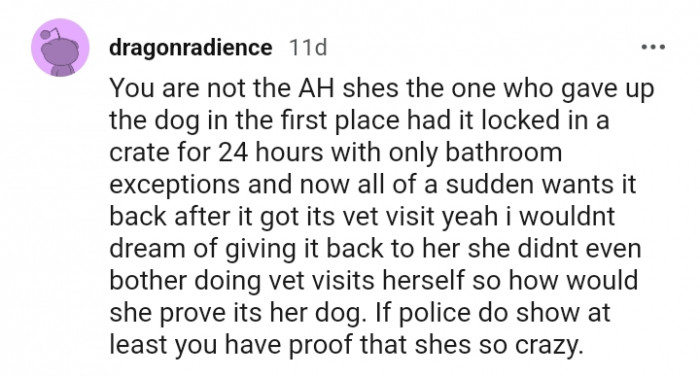
The Effects of Trauma on Decision-Making
Trauma can significantly alter decision-making processes. According to Dr. Judith Herman's research on trauma and recovery, individuals who have experienced trauma may develop heightened sensitivity to threats, influencing their choices in relationships.
The Redditor's decision to keep the dog may reflect a protective measure against potential trauma—both for themselves and the animal—demonstrating how past experiences shape present behaviors.
Practical Solutions for Responsible Pet Ownership
To prevent situations where rehoming becomes necessary, potential pet owners should engage in thorough research about the responsibilities involved in caring for a pet. Behavioral training classes can also help build a stronger bond between the owner and the pet, enhancing the overall relationship.
Additionally, having a robust support system in place, whether through family or friends, can make the transition easier if life circumstances change unexpectedly.
Great Pyrenees digs are big babies

What would be the reason to return it?

Give yourself a pat on the back

In terms of practical advice, fostering open communication with all parties involved can alleviate tensions. It's essential for the Redditor to articulate their feelings and concerns about the dog's well-being clearly. Engaging in a dialogue with the previous owner could lead to a collaborative approach to ensure the dog's best interests are prioritized.
Additionally, seeking support from a counselor specializing in pet loss or family dynamics might provide the Redditor with tools to navigate this emotionally charged situation.
Finally, educating oneself about the psychological needs of pets can foster a more compassionate approach to pet ownership. Understanding concepts like socialization and stress management for animals can lead to better outcomes for both owners and pets.
Training and socialization not only improve the pet's behavior but also enhance the owner's confidence in handling challenges, reducing the likelihood of feeling overwhelmed.
This Redditor is glad the pup has a new life
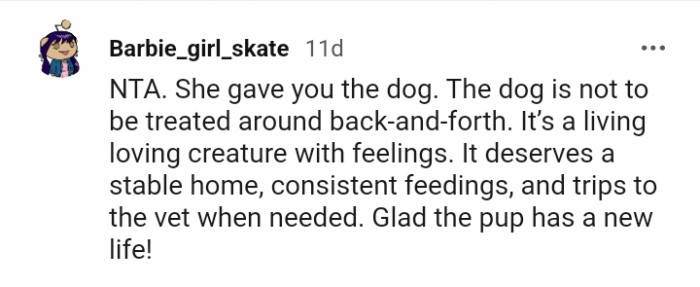
They rehomed the dog and the rest is irrelevant
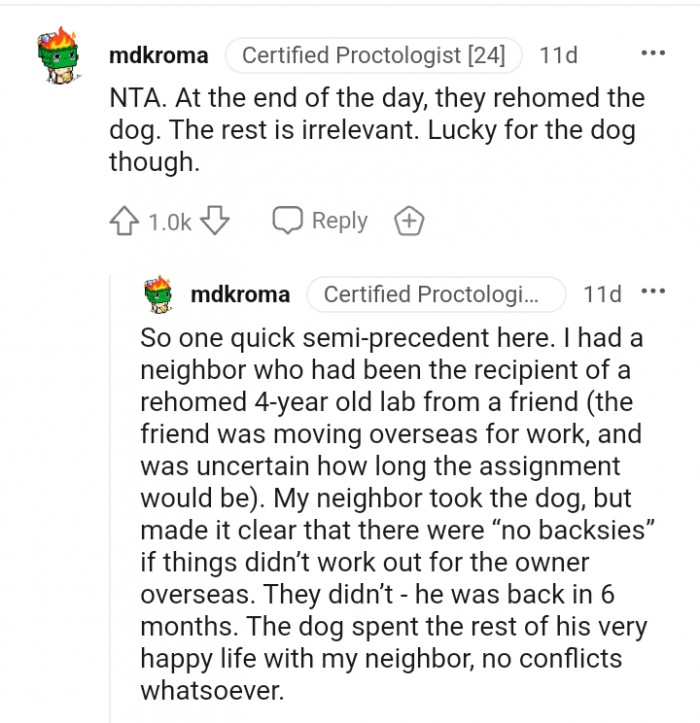
You gave the dog love and endless fun

Understanding Ownership and Responsibility
Ownership in pet relationships can often reflect deeper psychological themes, such as control and responsibility. The notion of 'responsible pet ownership' encompasses not just the physical care of the animal but also emotional considerations.
Research indicates that individuals who view their pets as family members are more likely to take their responsibilities seriously, often leading to heightened emotional distress when faced with rehoming situations.
Do you know what the situation is with the other dog?

Tell her she can have the dog after...
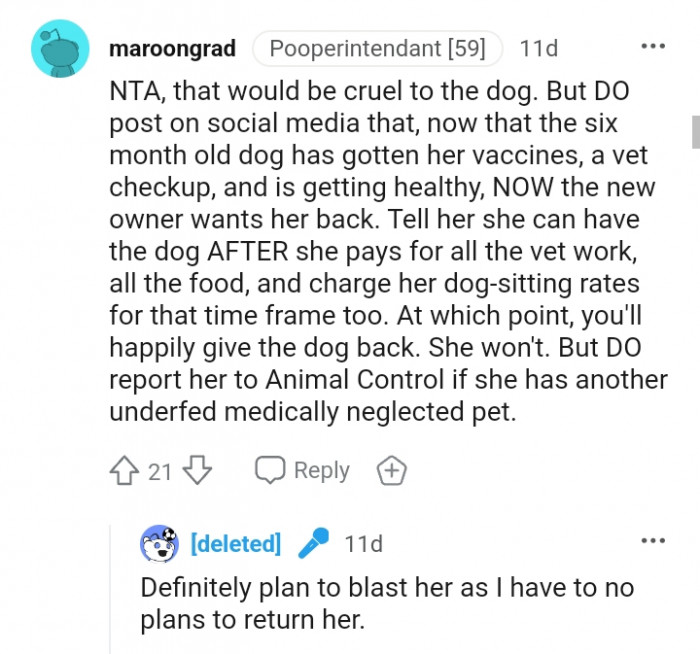
It's likely the kids don't know they have a responsibility
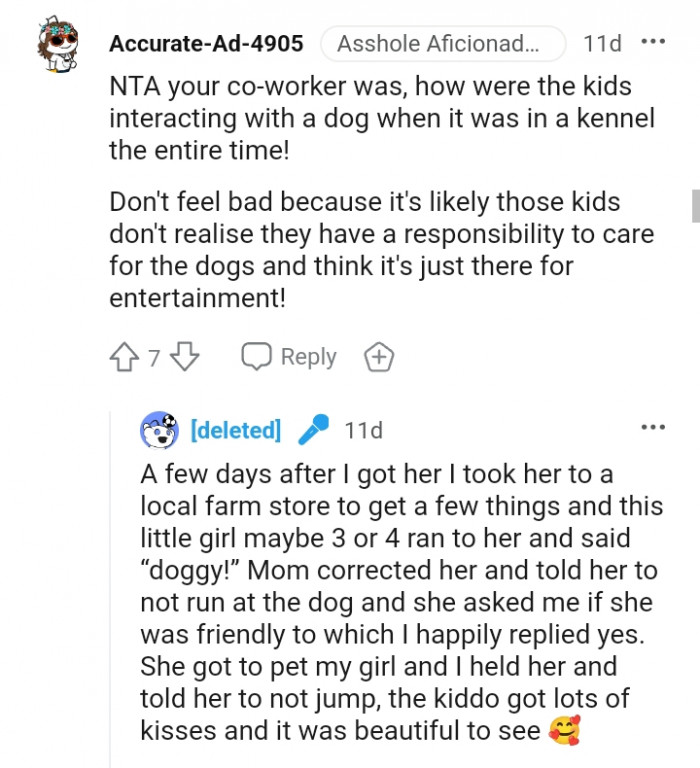
Lastly, it’s vital to recognize the role of community support in situations like this. Engaging with a community of pet owners can provide emotional validation and practical advice. Online forums like this Reddit thread can serve as a platform for sharing experiences and strategies for dealing with similar dilemmas.
Building a network of support can also reduce feelings of isolation and enhance coping strategies for those facing difficult decisions regarding pet care.
The dog is much safer with you
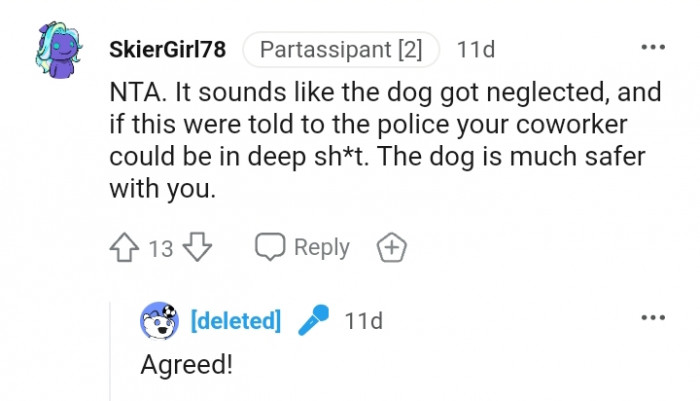
When your cat or dog rubs up against your leg or jumps on you when you get home, you experience a rush of delight. We are their caregivers, and our pets depend on us to provide for their needs, so the bond is reciprocal because they rely on us for our love and affection.
We completely understand why the OP is adamant about not returning the dog. Who would? The dog is hers, after all.
Psychological Analysis
This situation reflects a common psychological struggle where the bond between pet and owner becomes a source of emotional conflict. It's essential to recognize that these feelings stem from deep attachments and a desire to protect those we love, even in the face of difficult decisions.
Analysis generated by AI
Analysis & Alternative Approaches
In summary, the emotional complexities surrounding pet ownership and rehoming are significant and well-documented in psychological literature.
Understanding these dynamics can help individuals navigate their feelings more effectively and make informed decisions about their pets' welfare.
Analysis & Alternative Approaches
Ultimately, the interplay between emotional attachment, moral obligation, and psychological trauma shapes the complex decisions surrounding pet ownership. Understanding these dynamics can foster empathy not just for the animals involved, but also for the humans navigating these challenging emotional landscapes.
As mental health professionals continue to explore these themes, it becomes clear that the well-being of both pets and owners is intricately linked, highlighting the importance of compassionate communication and support.



